RICHARD KIRK / CABARET VOLTAIRE
home
News
New Reviews
Reviews Archive
Interview Archive
Hall Of Fame
Links
Contact


I interviewed Richard Kirk about the release of Cabaret Voltaire's International Language cd in 1993. Thanks to Instinct and Formula.
The impression I got after reading the book about Cabaret Voltaire, was that Stephen Mallinder was the club person and you the stay-at-home-person, but since then you have made the club music.
I personally got a lot more interested in dance music from listening to house and techno, and I really wanted to make some music that was part of that on-going situation.
Was there any particular artists that turned you on, at that time?
Marshall Jefferson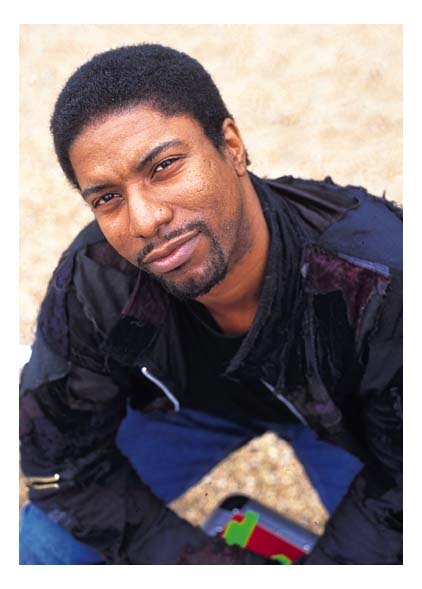
Um, sort of the obvious people like Marshall Jefferson in Chicago, and Juan Atkins and Derrick May coming out of Detroit. Quite a lot of other people as well.
Were you hearing this on the radio? Or picking up records?
It was basically from going to clubs in Sheffield, mainly. People in the north of England seemed to get into house music quite in a big way. And I don't know why it was. Sheffield, in particular, has always had a tradition of electronic music. You know, groups that were involved with the technology, so I can understand the interest there for a lot of people.
You worked with Marshall Jefferson in Chicago, was there anything about how he worked in the studio that was new?
Obviously house music was kind of really looking back to disco music from the 70's, so a lot of their ideas weren't particularly new. I just think the fact that they were using technology, and a lot of the house music that I was listening to was a lot more austere than disco ever was. Just the space in the music, for one thing, was something that interested me. I had always admired that in people like Kraftwerk anyway. And the way that people in Detroit started making records that had a real hard edge to them, but they were damn funky as well. And they seemed to adopt a new way of using technology in dance music.
Was it a writing-with situation when you made Groovy, Laid Back and Nasty with Marshall in Chicago?
We spent about a month in Chicago working with Marshall Jefferson. He was sort of co-producer with Cabaret Voltaire, and also he co-wrote three of the tracks. So we wrote some of the tracks out there and worked on them in the studio with Marshall. And he brought in different people that the knew. Ten City came in and sang some vocals and played some guitar. A Japanese guy Marshall used came in and played trumpet. And another guy came and played percussion. So it was quite an interesting experience.
And were the people in Chicago in the dance scene aware of your music?
Ah, I think yeah, quite a lot of them were. They seemed to be familiar with some of our work. I heard that the techno musicians from Detroit referred to Cabaret Voltaire. I certainly know that Derrick May was aware of Cabaret Voltaire. I spoke to him after he remixed Cabaret Voltaire's "Keep On." They seemed to be aware of us.

Another thing you did in Chicago was the Acid Horse single with Ministry. How did that happen?
That came about because Marshall knew Al Jourgenson because a lot of the house guys recorded at (Ministry's) Chicago Trax studio. And Marshall said "I want to introduce you to this guy because he's a fan of your music." And we had a week off from working with Marshall, so we decided to go in the studio with Al and Paul from Ministry, and also Chris Connelly. The record that you're talking about was the end product of that. One side of it was mixed in Chicago and the other side was mixed in Sheffield.
And who came up with the name for that?
I think it was probably Al or Paul.
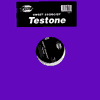
Tell me about the Sweet Exorcist "Testone" track you made. How did you come up with the bleep sound?
Well basically this guy I had been working with, Parrott, he's a DJ in Sheffield and is part of the dance band Funky Worm...he got this idea of making a record from the test tones that are used in studios. And he asked me if I'd help him do this record. So we just went in the studio and started making samples from this oscillator. And the track is built up around that. But just around that time there were quite a lot of tracks around which were using very, very deep bass. Like reggae-type of bass. And we started to hear some of these things, and we decided to use that too. The record was just to be played in this particular club called the Jive Turkey, which was a really hot club in Sheffield at the time. And we went in the studio and in the end "Testone" was the record we came out with.
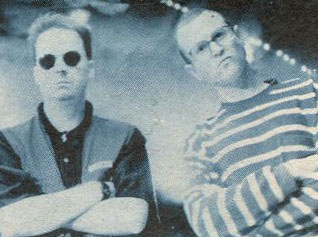
And did you have the feeling that it would be as popular as it was?
No! (surprised) I certainly didn't think it would be quite as popular as it was. But it was great to go into a club and see people's reactions to it. It was quite a special time in music, really. That period in Sheffield, there was a lot of things going on. A lot of good clubs and things.
Did that change your focus on the tracks you were making?
Yeah certainly, I think I brought a lot of that kind of feel to what I was doing in Cabaret Voltaire. That became pretty obvious with the records we have made since leaving EMI. They were going in that direction that was more in keeping with that...less commercial end.
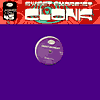
How did the "Clonk" sound come along?
(laughs) I think that was someone's idea of a joke. Which kind of got adapted by a lot of people in England because it was a stupid name for something...
You did a thing on Network in 1991 called Xon, that "Dissonance" track was pretty cool.
Right. That was a guy, Robert Gordon (Forgemasters) and myself. We just went in the studio, we worked together on and off. Rob produced part of Groovy, Laidback & Nasty for Cabaret Voltaire. We got on quite well, we had a lot of musical ideas in common so we just decided to go in the studio. We decided to do three tracks which we took to Network and they liked it so they brought it out. It probably sounds better now than it did at the time, in fact. Things have changed quite a lot musically since we did that.
Were the voice samples in "Dissonance" from somewhere special?
No, I think that is an emulator, not a specific sample from a record, just a real choir.
I found a record by Sonexuno that had remixes on it by you. The "Alchemy" track? (Slaughterback label 12" 1992)
That is guy called Graham, I've known him for a long time. He's used to play with Eric Random's band The Bedlamites. (who were on the Cab's label Doublevision)
With the club scene and the small independent labels innovation spreads very quickly. And I guess being on a major label things work a little slower. How was it being independent again?
Specially being on EMI, we didn't make many records during that period, just two albums. And I guess that is the way they like it. They don't like you to make too many records. You sort of make one record and spend a hell of a lot of time promoting it. Whereas when we originally started with Cabaret Voltaire we made about twelve albums in a three year period or something. So it was great to get back to work in that way again, and be able to put out a record a lot quicker. Groovy, Laidback and Nasty actually took two years to come out, which was a shame because by that time it didn't sound quite as fresh as it could have done. So that was just one of the things you learn by experience. But certainly getting back to work in the independent area was to me quite refreshing.
Have you ever met any industry types that understood the economy of scale that the independents work on?
I don't know, I'm sure a lot of people do understand that but I don't seem to have met them. To me it is quite interesting to make records more cheaply and make more records. Maybe they aren't going to sell to quite as wide an audience because you're not under any pressure to make a record that is in any way as commercial or anything like that. I think the music certainly benefits, but maybe the business side of it isn't as sensible as it should be. It just seems a better way to work really.
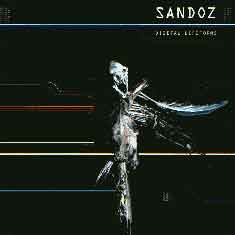
The Sandoz material on the Digital Lifeforms cd (Touch) were originally vinyl singles, right?
Yes, it is made up of three 12" singles.
Were they white label singles?
Yes, I just set up my own label (Intone) with a distributor, to get some music out last year (1992). And then Touch came along to me and asked if they could put them out.
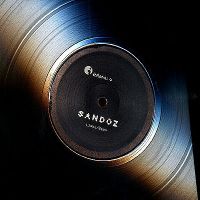
So was it a situation where the Sandoz releases were anonymous?
Yeah it was completely anonymous, initially.
What kind of buzz was happening for these anonymous releases?
Quite a good one. I was quite happy with the way that went, because I just put out these records and I don't think that until the 2nd or 3rd one that people realised it was anything to do with me, so quite a few nice things were said about the music. And it was very refreshing to hear that when you've been working with music for fifteen years, you know. It's nice to be judged purely on the music and not on the history, which was quite good.
Were there any tracks from the 12"ers that weren't on Digital Lifeforms?
Yeah, "Mapou" and "Erzulie."
Were the bonus tracks on the Dark Continent cd from the same sessions as the original vinyl tracks?
No, some of it was done much later. Some of it was done at the same time, like three, four months later.
How about new remixes, you've got something for Ultramarine coming up?
Yeah, there's a track called "The Badger" from their last album that I've just remixed around September of this year, that should be seeing the light of day pretty soon.
Does it have any of Robert Wyatt's vocals on it?
Yeah it does. It has some interesting scat from Robert on it. I think it is some vocals that they didn't use on the album, which I used for my remix. Because they sent me all the session on disks to sample from, so I had quite a bit to play with.
Are you as much of a fan of his work as Ultramarine are?
Probably not as much as they are, I mean I'm obviously aware of Robert Wyatt and his history. (Wyatt's band) Matching Mole and people like that. But I'm probably not such a great a fan as Ultramarine.
What did you do with their track, anything weird and wonderful with his voice?
It's a little bit difficult to describe. It's a lot heavier. And the bass is probably a little bit more, in yer face, than on the album version. But it is recognisable, it is not one of those kind of remixes where you don't recognise it from the original. I did keep quite a lot of the original track in there.
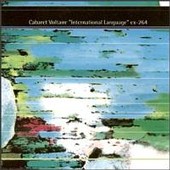
Tell me about International Language? I heard you guys have a lot of things in the can. Are you catching up to things you hadn't mixed?
No. I mean International Language was recorded on and off over a period of two years, but it actually assembled and finally mixed in about a two week session.
It seems like on the recent releases you are working with longer, 8 to 10 minute tracks.
On the next one? There is a track that is 52 minutes long. ("Project80" on The Conversation
52!? It seems like you are playing with forms all the time with your longer tracks.
Well, it is nice sometimes to switch the computer off and just improvise and see what happens. Because that is one thing that I don't think people do a lot of these days. A lot of music is sequencing computers. But it is nice mixing from the board, sort of mix it manually and just let things evolve and see what happens.
There are a couple of slogans on the artwork, "abandon thinking" is one.
That was taken from one of the pieces of dialogue on International Language. It was put there by one of the guys at The Designers Republic who did the sleeve. It was his little joke.
I think what people might miss in what you are doing now is that is encompasses all the things that you've done before. So you'll have the sinister ambience, the quotes of dance music and experimental music, all in the same track like the opening one, "Everything Is True." And you seem still fascinated with sampling American voices, like things from the 70's, maybe Black Panthers, on this new album.
Yeah, there is quite a lot of that stuff in there, but there is also quite a lot of European dialogue, like German and Spanish and things like that. Obviously we still use American voices because I think they have a certain musical quality to them that maybe British voices don't have - or if they do I don't hear it in that way. So we always do go back to that, from time to time.
What is the effect that you want with the samples you use? Like in the track "Millenium," do you use them for the political content or the visceral impact of the words?
I think a little bit of both. Politically there are a lot of messages contained in that record, but as in the past with Cabaret Voltaire we are not trying to put across any political point of view. More just observing and juxtaposing different ideas together. And really, at the end of the day, it's down to the person that is listening to read into it something, if they want to. We're not making any specific message.
Did anyone pick up on the Popol Vuh sample ("Bruder Des Schattens - Sohne Des Lichts" from Nosferatu) in that track?
sssh! (laughs) A couple of people have mentioned it, but...it's nice that people recognise it. It's a great piece of music.
On the "Taxi Mutant" track you've sampled yourself (from the Johnny Yesno album). How do you find yourself going back and sampling your older music?
Well, I suppose, a lot of other people seem to sample Cabaret Voltaire these days, I don't see why we can't join in the fun.
With this material it seems the grounding is a cool Detroit techno kind of sound, what is it about that style that still holds you?
I don't know, the fact that a lot of it is kind of hard sounding and aggressive rhythmically, but it is also very, very melodic. That is what attracts me to it a lot of the time.
And it can be very subtle too, and spin off into jazz at the same time.
Yeah, it is very clever.
Do you have an interest in minimalism at all?
Yeah, certainly in music I admire people who can get things across in a very simple way. Kraftwerk are probably the masters of minimalism, if anyone. But in terms of a concept or in the art world, I don't particularly study it.
How about Philip Glass or Steve Reich?
Yeah, I've been aware of their music for a long time. Probably I would prefer Reich to Glass in a matter of personal taste. But they've got quite interesting ideas which remain interesting to me.
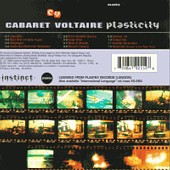
There was a video for Plasticity announced, who was the director for that?
It never got made. It was advertised on the sleeve for the original British release and it was meant to be through Factory Records' video label Ikon. But it kind of had business problems and the funding to finish the video never came. So the video never got made, unfortunately.
Any recent videos?
No. I mean, last year we put together a lot of visual material because we did a live performance in Rotterdam, last July. And also went on tour in Britain in November/December. So that was the last original video material that we generated.
Mal is now living in Australia?
He is moving there in about two weeks.
Any particular reason for that?
I couldn't really say. Maybe a change of scene. Maybe he doesn't want to bring up his kids in London. Or maybe a mixture of a few of those things.
What were some of your favourite releases this year?
I buy a number of dance singles and I can't remember the artists, to tell you the truth. I'm not so mad about new releases, so I've been listening to a lot of Fela Kuti over the last year, and a lot of salsa music.
Any salsa artists in particular?
Maybe Ray Barreto, I've been listening to a lot of his music.
Do you like any of the new ambient music that comes out of Germany?
Yeah. A lot of the German stuff is quite interesting. I quite like the music a lot of the music that comes out of Holland. There are a couple of labels in Holland that are putting out decent music. And quite a few people in England that I like still. People like Black Dog have their own thing they are doing. A lot of the terminology of this sort of ambient, to me, I don't know, I wouldn't describe a lot of the music that is categorised in that way as being particularly ambient anyway.
What did you think of Scanner?
It was okay. Quite an interesting idea. Something probably like an idea that is more interesting than the end result.
Did you ever get samples in that way?
No, I've never used a scanner to tap into people's personal telephone conversations, but I do use a short wave scanner to collect music and sounds from.
What are your opinions on sampling? Did you hear about this thing with U2 and Negativland a couple year ago?
Oh yeah. Negativland have been going a long time, haven't they? Are they from San Francisco? So it's the same band that existed in the late 70's / early 80's.
I wrote an article about them and I tried to find out if anyone in the art world had established appropriation as a legitimate technique, and no one ever has.
I don't know. I think basically I wouldn't really agree with the idea of lifting whole chunks of someone's music. I think using pieces of dialogue from movies or dialogue from the television or whatever, to me that is fair game. I don't know whether if there is a copyright that exists on that anyway, I haven't gone into it legally. I think that people who are lazy, who just sample a piece of someone else's music, or they can't be bothered to write any themselves, I'm not too into that. But I'm into the idea of creative use of samples. I think that it has been really good for music, provided you can add something into yourself, or change the sound, or maybe if take a drum beat, cut it up and reassemble it in some way. But, you know, that is really my attitude to it. The situation seems to be that if you take a sample and the record sells maybe a few thousand copies no one is going to bother you. But if you do something and it starts to sell and there is money generated then there is a problem. And maybe if that is the case you just cut a deal with the people who claim the copyright on it anyway. I guess that is the way people deal with it.
Are you starting to see contracts that say you have to clear all your samples?
Yeah, yeah, that is obviously there to protect the record company. But I don't know how strong that side of it is. I don't think about it that much because the work I'm involved in doesn't use huge chunks of people's music.
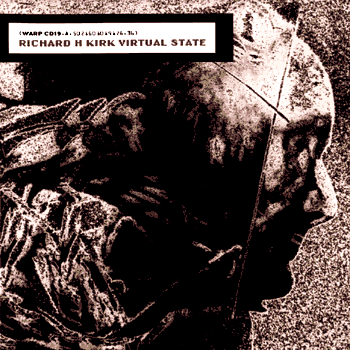
Brainwashed's Kirk / Cabs site
Kirk news